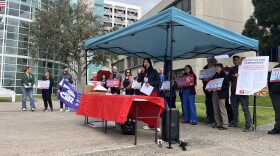On Wednesday, the Board of Supervisors unanimously approved undertaking a study of existing renewable energy infrastructure as part of the proposed Regional Decarbonization Framework.
Requested by Supervisor Jim Desmond, the study would focus on regional residential, commercial and other infill development, and also identify available roof tops, parking lots and other infill capacity for future renewable energy projects. Infill development involves building on unused and underutilized lands generally in urban areas.
Supervisors directed the chief administrative officer to conduct the study and then present it in 180 days.
The RDF proposes strategies to reduce carbon emissions to net-zero levels no later than 2045, matching the carbon neutrality goal California set in 2018. The board would not be able to approve any final plan until a new District 4 supervisor is seated.
In May 2022, supervisors approved sustainability initiatives, including planting more trees in unincorporated areas, as part of the RDF.
In a board letter, Desmond stated that the county "must consider various approaches to decarbonization and embrace a range of energy supply sources, which increases reliability and community resilience to energy emergencies such as blackouts and brownouts, and would also help ratepayers maintain some degree of control over their energy needs."
Desmond, during the meeting, described the decarbonization plan as a noble cause, and said he hopes the new study will "add value to it."
The District 5 supervisor said many of his constituents are concerned about the regional framework in its current form, in that there's not enough information to justify some proposed costs.
Board Chair Nora Vargas said Desmond's suggestion not only advances a decarbonization plan and is important to lower-income communities but also "actually complements the work that we're doing already."
Vice Chair Terra Lawson-Remer also offered support for the study, and added it was important that the county take a careful look at rooftop solar — not just for the decarbonization plan, but also for San Diego Community Power, a non-profit and locally run energy provider.
During public comment, Serena Pelka of the Climate Action Campaign said it was important to have "the most accurate assessment that is representative of the benefits local solutions like rooftop solar provides the communities, including improving equitable access to clean energy."
Lee Rogers of Borrego Springs said that renewable energy on rooftops and parking lots mitigates risks and increases resilience. He cited a recent federal Governmental Accountability Office report on how climate change threatens the nation's electricity grid, including transmission capacity and distribution lines.
Several other Borrego Springs residents urged the board to be careful about increasing the number of large solar-panel projects in their desert community.
One woman said such projects are "turning our deserts into buzzing seas of solar farms," and hopes the study helps leaders find better solutions than those currently proposed.
David Garmon, of Tubb Canyon Desert Conservancy, said the new study was "a great start in the process of improving a document that will serve as a road map for all of San Diego County for decades to come."
Garmon also said he hopes that the county hires study consultants not connected to the utility industry.
Supervisors are also reviewing a Climate Action Plan, which won't be ready for formal approval until the fall of 2024.
In September 2020, supervisors voted to rescind the original CAP, first adopted in February 2018, and move forward in creating a replacement after a Superior Court judge ruled the original plan didn't comply with county or state goals for reduced emissions.








